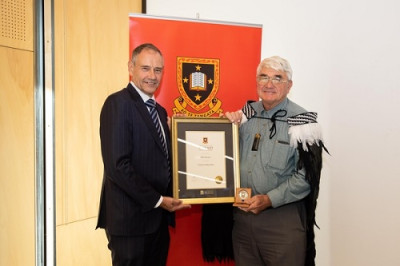
Senior Deputy Vice-Chancellor Professor Alister Jones presented the medal to Rob McGowan on behalf of Vice-Chancellor Professor Neil Quigley, at a ceremony yesterday.
The University of Waikato has awarded its prestigious University of Waikato Medal to alumnus Rob McGowan for his significant and sustained contribution to protecting Aotearoa’s Indigenous ecosystems.
Senior Deputy Vice-Chancellor Professor Alister Jones presented the medal on behalf of Vice-Chancellor Professor Neil Quigley, at a ceremony yesterday.
Rob graduated from the University with a Bachelor of Education in 1996. He followed this with a Master of Social Sciences in 2000 and has spent his career helping to regenerate our biodiversity and educating others about our native ecosystems and how to protect them.
Rob became interested in the New Zealand bush at a young age after watching his mother use traditional plants and herbs for wellness and wellbeing, based on traditional knowledge brought to New Zealand from her homeland of Dalmatia.
In the 1970s he was posted as a Catholic priest to Whanganui and it was there, on the river, that he started to gain the knowledge he is known for today, propagating and growing native plants.
In 1999 he co-founded Tāne’s Tree Trust alongside University of Waikato biologist Emeritus Professor Warwick Silvester. This trust encourages the use of New Zealand Indigenous tree species for biodiversity, landscape enhancement and cultural benefits.
Since 2006 Rob has also been involved with Ngā Whenua Rāhui, a Te Papa Atawhai Department of Conservation funding programme that aims to support the protection of Māori land and Indigenous ecosystems and to preserve mātauranga Māori.
Rob is a long-time member and former chair of the Bay of Plenty Conservation Board, a founding chair of the Kaimai-Mamaku Catchments Forum, and a life member of the New Zealand Association of Medical Herbalists.
In 2018 he was awarded the Department of Conservation’s Loder Cup for his outstanding contribution to conserving native plants of New Zealand and in 2020 he received a Queen’s Service Medal for his contribution to conservation and to Māori.
“Rob has made a significant and sustained contribution to regenerating degraded land and streams and to educating others in protecting Aotearoa’s Indigenous ecosystems,” said Vice-Chancellor Professor Neil Quigley.
“For his long standing contributions I am very pleased to award him the University of Waikato Medal.”
Rob has also championed Tiwaiwaka, six principles which create a philosophy for our approach to life and restoration of our natural world. He has become a sought-after rongoā Māori (traditional Māori medicine) practitioner and advisor and travels around New Zealand working alongside local iwi to deliver workshops in rongoā Māori. At his home on the outskirts of Tauranga he has also planted a rongoā garden to help students learn plant identification, and he and his wife Lyndel run a small nursery for the Waitao Landcare Group.
He does this alongside consulting for Te Whatu Ora Bay of Plenty, with whom he is working on a Māori health strategy. Rob has also written two books on land regeneration, with one of them, Rongoā Māori: a Practical Guide to Traditional Māori Medicine, selling more than 9,000 copies.



